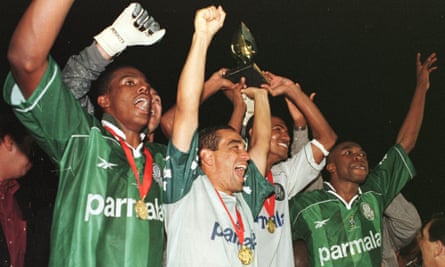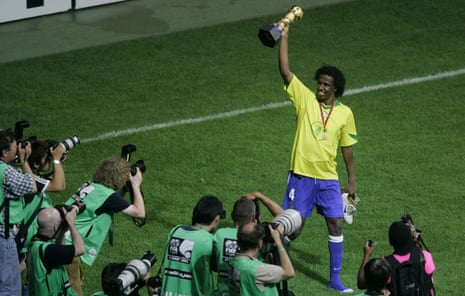Roque Júnior won just about everything he could in football: a Copa Libertadores title with Palmeiras in 1999, the Champions League with Milan in 2003, and the World Cup with Brazil in 2002. Only three other players in history have pulled off that particular treble of trophies: his fellow Brazilians Ronaldinho, Cafu and Dida.
One of the few places Roque Júnior did not win any silverware, though, was at Leeds United, where he had a brief stint in 2003. “It didn’t go as I expected on the pitch, because I needed time to adapt. Leeds had a great structure then, but they were going through a hard time financially and ended up being relegated and spending a long time away from the Premier League.”
During his time in England, Roque Júnior played seven games and scored two goals, both against Manchester United in a 3-2 defeat. “With time I would have adapted to the Premier League, but it was a great experience for me. I view the opportunity to have played in England as a positive one.”
He still watches Leeds and has his own experience of facing Marcelo Bielsa, who was in charge of Argentina when they met Brazil during qualifying for the 2002 World Cup. Argentina won the game in Buenos Aires 2-1 and went on to top the South American qualifying group.

“Bielsa is someone who truly knows football,” he says. “He’s a more introspective head coach, but one that knows how to communicate his ideas to his players, which is the most important part. It’s not easy to go from the Championship to the Premier league in such a short time and still be able to keep your team competitive. Leeds are also going through a financial reconstruction. What goes on on the pitch is a reflection of good management and planning.”
Talking about management, he is also a student of the game, a passion that was stoked while playing for Bayer Leverkusen. “Germany was always really well set up. It has a culture of internal organisation, of caring about the clubs and the whole league’s maintenance. It’s not about only managing the physical structure, but football as a whole. It’s about looking at the future, at which type of development is best, and then sharing this throughout the whole country.”
Having taken various coaching courses and taken charge of two clubs in Brazil, how does he feel his own country measures up? “We’re getting better, but slowly. Football is not only about what’s going on on the pitch. You have to be able to connect the three spheres: the politics, the management and the technical aspect. By thinking collectively, you will provide a better spectacle.”
He believes some of the togetherness he experienced while in the Brazil squad has been lost over the last two decades. “Back then, players spent more time in the Brazilian league, which is in some ways how you end up getting familiar with our culture and roots. You had to win here before going to a big international club. This has changed. Our players are leaving earlier and earlier. This has positives, as they adapt more quickly to Europe. But, on the other side of the coin, they lose some identification with our shirt and with the national team.
“There are a lot of factors that go into making a squad that wins the World Cup. You have to have a lot of strong players, and we used to have them in quantity and quality. Today, we still have quality, but not in the same quantity. At a World Cup, you also have to abdicate some of the ‘I’, of the personal, and focus more on the collective. There has to be a great environment. Any issue can compromise it, since it’s such a short competition.”

He won the World Cup while playing his club football at Milan alongside legends such as Paolo Maldini, Gennaro Gattuso, Andriy Shevchenko, Rivaldo and Leonardo. There were three Italian clubs in the semi-finals when Milan won the Champions League in 2003. Why does he think Serie A has declined since then?
“You can’t analyse the Italian league without talking about Italy the country. Italy went through a crisis that still affects its people and directly affected its clubs. The clubs started being sold and, with this, you also lose the financial power that the league once had. Besides that, other leagues grew. Italy stagnated a little in the organisational side as a whole, while countries like England and Germany started to do it better.”
Speaking of organisation, he believes Palmeiras – the club he represented more than 200 times in his early days in Brazil – have enjoyed a renaissance due to a change in their structure. Palmeiras are currently reigning Copa Libertadores, Paulistão and Copa do Brasil champions, which Roque Júnior attributes to the arrival of a new president a few years ago.
“Palmeiras changed when Paulo Nobre [the president of the club between 2013 and 2016] came aboard. Before that, the club was going through difficulties, even going down to Série B. But after he took over, everything changed. Lately Palmeiras have been playing in the Libertadores regularly, have won the Brasileirão twice, and compete for trophies. You need to have a plan to keep doing this year in, year out – and Palmeiras is currently on this path.”

Not only does he have a keen mind for how football works on the pitch, in boardrooms and at the international stage, but he also pays close attention to politics and cultural changes. “Recently I was reading a piece about democracy that really caught my attention,” he says, speaking calmly and softly but with weight behind his words. “Democracy is being able to speak your mind but with respect and without oppression. You have to try to convince me about your point of view using ideas. We have to be a lot more calm, especially the people in power. They should set an example to be followed. If our government can’t provide this, it’s up to us as citizens to stop this polarisation we’re living in.”
Although, he does not think that every subject is worthy of debate. “Regarding the question of racism, this is a historical fact. There’s no agreeing or rejecting this. It exists. In Brazil we had 300 years of slavery. We have to know our history. Only by knowing will we be able to understand how many black people suffered and still suffer to this day. You have structural and individual racism. You have to punish it and, at the same time, provide affirmation policies for black people.”
He stands firmly behind any players who are protesting against racism today. From a playing perspective though, as a great centre-back of the past, which current players does he admire the most? “It’s hard,” he says. “There are players who have been doing this for a while, like Chiellini. You also have our Marquinhos, who is a great defender. And Sergio Ramos, from Real Madrid. These are the ones I would highlight.”
Even though he admires the players of today, he does not yearn for anyone else’s career. “I don’t even allow myself to talk about regrets in my career because I was able to fulfil my dream. I won championships, I reached one of the big Brazilian clubs, then I went international and won more trophies, and then I won with the national team. I won everything I wanted and more.”
Even though he won so many titles in so many countries, there was no hesitation in pointing out the happiest moment of his career as a player. “The best one was being world champion, with all the tradition that our country has, and being part of the Brazilian squad enjoying this magic of being one of the few players to raise the trophy. Being world champion with Brazil brought me my greatest happiness.”

Comments (…)
Sign in or create your Guardian account to join the discussion